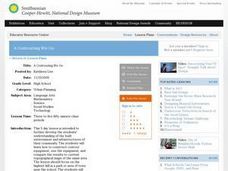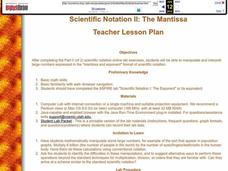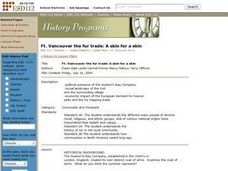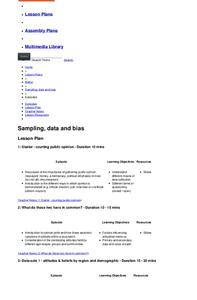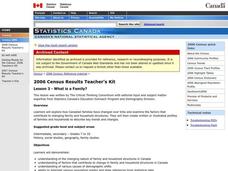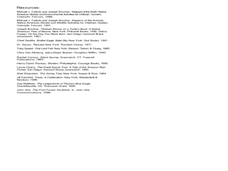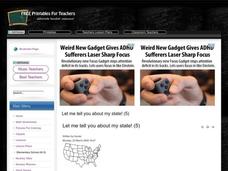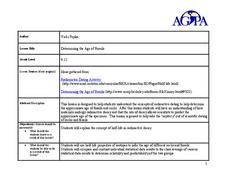Curated OER
A Contouring We Go
Students examine the built environment and infrastructures of their community by constructing contour equipment, using the equipment, and comparing their results to current topographical maps of the same area
Curated OER
Scientific Notation II: The Mantissa
Practice converting a conventional number into scientific notation, and vice-versa. Using an applet, they perform the operations of multiplication and division on numbers expressed in scientific notation.
Curated OER
Let Me Tell You About My State
State reports can be a lot of fun, especially when the learners get to choose the state they study. This research and writing-focused social studies lesson engages learners in collecting information, essay structure, research, and...
Curated OER
Cyber Bullying
Cyber bullying is an important topic to address with middleschoolers. Here, learners take an active role in identifying and discussing this issue. Reviewing this resource with your class will help to equip them to be a part of the...
Curated OER
Native Species Restoration: Is Saving One Species Hurting Another?
Students investigate the effect of human activities upon the environment. The studying experience encourages students to think about the issues involved in native species restoration.
Curated OER
Ft. Vancouver the Fur Trade: A Skin for a Skin
Students study Fort Vancouver. They discuss trading and what is meant by "a skin for a skin." They complete math story problems that represent possible trading scenarios. They explore the Chinook Jargon trade language.
Curated OER
Ft. Vancouver Fur Trade: a Skin for a Skin
Students examine political presence of Hudson's Bay Company, explore economic impact of European demand for beaver pelts and the fur trapping trade, and practice counting in Chinook Jargon.
Curated OER
Composite Functions
Students create a poster to explain composite functions. In this composite function worksheet, students explore linear equations and functions. They complete a worksheet and use manipulatives to complete problems.
Curated OER
Scientific Notation III: Linear vs Exponential
Students after investigating examples of exponential growth students have an intuitive feel for the concept of exponential growth of a system.
Curated OER
Maps
Students investigate threee types of maps. For this algebra lesson, students idenitfy different maps and explore how they relate to the area keeping cllimate and topography in mind. They discuss maps used to navigate land. air and sea.
Curated OER
LAND USE ISSUES
Learners relate math with real life situations. They identify and plot points on a grid map. They identify and locate the Drop Box Sites.
Curated OER
Testing Your Water
Students perform several water quality tests on groundwater from their area. They use test strips to determine the pH, hardness, alkalinity, nitrates, iron and chloride levels.
Curated OER
Battery Power
Sixth graders examine how much energy they use in the form of battery power. They examine the cost of using regular vs. rechargeable batteries and examine the effect on the environment of the two types of batteries. They discover that...
Curated OER
Whale Watcher Game Lesson
Students participate in an online whale watching game. They identify the reasons for migration and describe the route. They make predictions on what would happen if the ways did not migrate.
Curated OER
Using Vegetation, Precipitation, and Surface Temperature to Study Climate Zones
Middle schoolers begin their examination of the climate zones found around the world. Using a software program, they identify the relationship between the vegetation, climate and temperatures of the different zones. They also plot...
Curated OER
Louisiana Regional Foodways
Learners strengthen their research techniques in locating, selecting, and synthesizing information from a variety of texts, media, references and internet resources to study regional food way traditions in Louisiana. They assess the...
Curated OER
What is a Family?
Students explore how Canadian families have evolved over time. In this census results lesson, students examine the factors that contribute to changing family and household structures. Students also create written and illustrated profiles...
Curated OER
Red Tail Ridge Wetland Study Project
Fifth graders use a real life scenario of the wetlands to gather information on creatures of the habitat. In this wetlands lesson, 5th graders research the interdependence of organisms in a healthy habitat. Students collected samples...
Curated OER
Let Me Tell You About My State
Fifth graders research one of the 50 U.S. States that they were unfamiliar with. For this U.S. Geography lesson, 5th graders utilize encyclopedias as well as the Internet to research a chosen U.S. State in order to write a report....
Curated OER
Survival Of The Fittest
Seventh graders examine the concept of an ecosystem and how there is a variety of representations of life that exist there. They look at the equilibrium that is reached in stable communities and how the variable of change in...
Curated OER
What Percentage of your Class is Right or Lef Handed?
Students using their right hands, put the first letter of their last name in each square on a piece of square grid paper. Then after the 20 seconds is up, they do the same thing using their left hands.
Curated OER
Sustaining Life Under the Ice
Students design and conduct experiments in order to identify the components of lake water environments that are affected by winter ice cover. They use the experiment results to propose effective human management of these ecosystems.
Curated OER
A Tasteless Tasty Test
Students review the inheritance patterns of simple dominant and recessive traits in humans. They use PTC tasting as a model trait. Each student determines whether or not they are a taster using PTC paper then they compile and discuss the...
Curated OER
Determining the Age of Fossils
Students examine the concept of radioactive dating. In this radioactive dating lesson plan, students investigate how to determine the ages of fossils and rocks as they learn about half-life radioactive decay.


